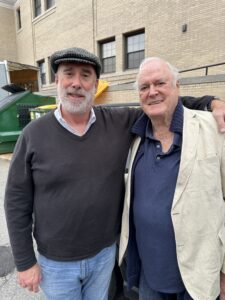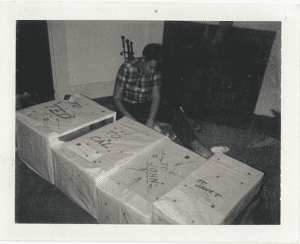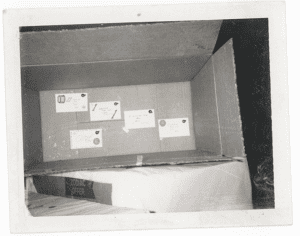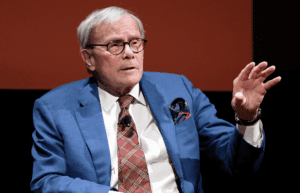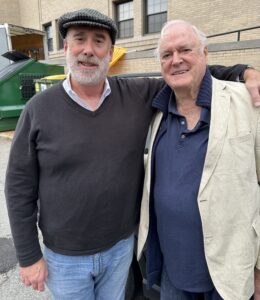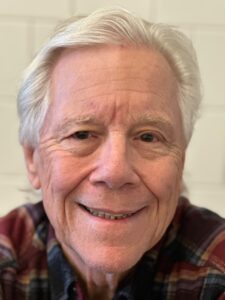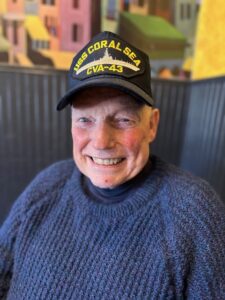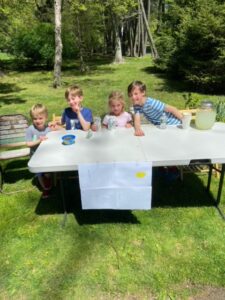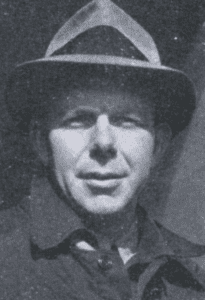
A lemonade stand staffed by very young entrepreneurs.
One Christmas, a year when three of my brothers were in college, my parents were feeling especially strapped due to the simultaneous tuition payments. These days, most people would take out college loans. Not mom and dad. We came downstairs Christmas morning to see the usual festively wrapped boxes under the tree.
When we opened the boxes, we found that each was empty except for a notecard with an IOU; mine read “IOU one Monopoly Board Game” signed, “Love, Mom & Dad.”
It turned out to be my favorite Christmas ever because I missed my older brothers and it was great to have them home for the day.
A few years after the IOU Christmas, my mom discovered that a large bag of brown rice she’d purchased a long time ago was crawling with worms. I begged her to throw it out, but she refused. “It’s perfectly good rice!” she said, handing me and my brothers tweezers to pick the wriggling worms out — a maddening task because the worms were the exact same color and size as a grain of brown rice.
My parents’ extreme frugality manifested itself throughout my childhood, including my Dad’s habit of draping used paper towels to dry in the kitchen so he could use them again later, mom making her own clothes at her Singer sewing machine, and my having to wear only hand-me-down shoes from my older brothers.
Growing up, my feet were often scrunched in shoes one or two sizes too small for me, resulting in permanent hammer toes.
All this despite the fact that my dad was a successful executive with Polaroid at a time when it was a high-flying company. We weren’t poor. We just acted that way. Having scraped by in the Great Depression, my parents saw waste as a cardinal sin and saving money as Godly in some agnostic Unitarian way. Within the mythology of Brokaw’s greatest generation, hard work and skimping pennies were valuable weapons in the arsenal of our economic battle for a better life.
Having lived like a middle-class sharecropper as a child, I swore my kids would indeed have a better life, even if I went broke making it happen.
When our daughter was in middle school, she begged us to go on a trip organized by People to People, a group founded by President Eisenhower to foster better relations with other countries. We ponied up over $3,000, which was a lot for us to spend back then. And the country Abigail visited in order to improve global relations? Australia.
My wife and I have been knuckleheads in many ways with our money (or lack thereof), but we did save on the road to retirement thanks to a recurring character in this book: my Gramp. I never inherited money from him. I did, however, take lessons from him that I’ve carried with me to the bank.
Gramp was an independent sales rep who traveled around New England selling retail displays. These were the early days of three-dimensional plastic signage that could be affixed to glass storefronts. The trunk of Gramp’s Rambler was always packed with these signs (for some reason the penguin smoking a cigarette display stuck in my mind). Gramp made decent money and saved what they could.
Once when talking with me about investing, Gramp grinned and said with a wink, “Oil stocks.”
All through the 1950s and beyond they socked money into stocks in the booming post-war energy sector. When they retired, they could afford to keep their place in Vermont and buy a nice condo in Tucson, Arizona.
Why do these stories matter? Earlier in the book I wrote about the first grandparents 30,000 years ago, the ones who began the tradition of teaching their kids and grandkids the everyday tips needed to survive and thrive. The grandparents could, for example, demonstrate the best way to plant seeds for successful crops — marking a shift towards agrarian versus nomadic communities. The wisdom imparted by these grandparents had a snowballing benefit as more and more techniques for living longer and more productive lives became broadly shared.
Thinking metaphorically, what are the seed planting tips that will help our grandkids become the greatest generation?
One area they need help with, desperately, is finance. The United States is considered a wealthy nation. Yet roughly half of Americans aged 65 and older get at least 50 percent of their family income from Social Security, and 25 percent of them get 90 percent. The Social Security Administration projects that the funds will run out by 2041. In that year my youngest granddaughter will be 19. How and when will she ever be able to retire?
Social Security’s woes wouldn’t be such a huge problem if people saved enough to sock away money in their retirement accounts, but they don’t. The average median retirement savings in the US is a meager $87,000. Saving for retirement, of course, is only one part of the financial challenge our grandkids face. About half of Americans have no emergency savings whatsoever. Zero.
Inspired by Gramp, I bought my first stocks when I was a junior in High School and have kept at it.
My wife and I never seemed to have much left over after paying for things like the kids’ braces—not to mention my daughter’s visit to the Great Barrier Reef to repair relations with the Australians—but we put away money each year in our 401k plans and that has grown over time. Following Gramp’s independent work example, I started my first company—a housecleaning business—when I was a High School Senior. Making money cleaning toilets seemed like magic, literally turning shit into gold, and I could set my own hours. After starting out as a copywriter with an ad agency in New York City after college I founded my own marketing agency and never looked back.
And now—shazam—all these grandkids are running around. The Fundamentals of Finance classes are not taught in their schools, not even at the best high schools.
Which means it’s up the parents and grandparents to get the job done. How, I wondered, could I as a grandpa help them learn from me as I learned from Gramp, but take it up a notch. Maybe, like a second language, entrepreneurship is best learned in childhood. While I was ruminating on this idea I happened to be visiting my daughter and her boys in Connecticut one day when they decided to set up a lemonade stand. The other grandpa in my grandsons’ lives, Jack Moore, was visiting as well. Jack, 75, headed up State Street Bank’s pension fund division before retiring in 2017.
“Great idea!” said Jack. “I’ll help.”
Everyone threw in ideas for getting started. Abigail and her husband, Ryan, said they could pick up some lemonade mix and cups at Costco. The boys would draw a sign. A card table was carried up from the basement.
I said to the boys, “Make sure you write down the cost of the lemonade and cups so you can keep track of your profits.”
“What?” they said in unison through mouths full of breakfast.
“It’s not about how much lemonade you sell,” I explained, “it’s about how much money you actually make per cup of lemonade after you take your cost of goods into consideration. The money you have after you subtract your expenses for lemonade and cups will equal your profit.”
The boys stared at me, chewing, digesting this concept thoughtfully.
“Ordinarily,” I went on, “you’d have to pay someone to sell the lemonade for you. That would be your cost of labor and you’d have to subtract that from your profit, but since you’ll be selling it yourselves you don’t have to pay anyone else.”
After some initial head scratching they were all over the idea of making a profit.
When Ryan returned from Costco with the supplies, they boys examined the receipt and did the math, then we discussed how much they should charge per cup of lemonade. How much would people reasonably want to spend per cup? If they paid $1, how much would be left of each dollar after the cost of the cup and the Lemonade mix was subtracted. Doing this real-world math was really fun for them.
Jack helped them set up their stand on the street and soon, like Tom Sawyer painting the fence, they were joined by other kids up their street. They were all hopping up and down with their sign to get cars to pull over – which they did, in droves. At one point, the kids flagged down a firetruck from the local fire station. Grinning and evidently thirsty firemen hung out with the kids, and my grandsons got to try on their helmets.

The kids got to wear the fireman’s helmet.
As the afternoon wore on, the dollar bills in their bucket grew like leafy green plants in a fast-motion time lapse film. Stepping back from it all, seeing them boisterous and laughing in the sun, I saw these boys and girls growing in fast-motion, too, spouting up before my eyes. They had one foot in childhood. The other in business school. They rocked it!
We grandpas played our role that day, but the ultimate lesson came courtesy of their dad.
Ryan encouraged them to set aside a percentage of their lemonade stand profits to donate to the local fire department. They loved this idea. I loved this idea. What a fantastic lesson: pull money out of thin air, make people happy with a refreshing roadside beverage, earn a video game versus begging for it, and allocate a percentage of profits to help others.
Capitalism is by no means perfect, but at its best it is the greatest engine of prosperity. The Captains of Industry of the 19th and 20th centuries built their vast summer “cottages” in Newport, Rhode Island. Yet they also established philanthropic organizations that to this day benefit millions of people every year. Paul Newman famously allocated all of his Newman’s Own brand profits towards charity. “Give it all away!” he said.
To create large-scale positive change in their lifetimes, our grandkids need not become fabulously wealthy. They can start by simply making a decent living, regardless of the color of their skin or what town they grow up in, and along the way do the small things that matter — modest donations to their fire department or a local charity. The littlest gestures repeated by millions of young people will add up to the better world they will live in. We need to help put this power in their hands, one cup of profitable lemonade at a time.
If there is a heaven—and I strongly suspect there is—Gramp smiled and chuckled at the site of his great-grandsons jumping up and down with excitement at the lemonade stand, their whole lives ahead of them. “That’s just dandy,” he said, “wonderful!”


